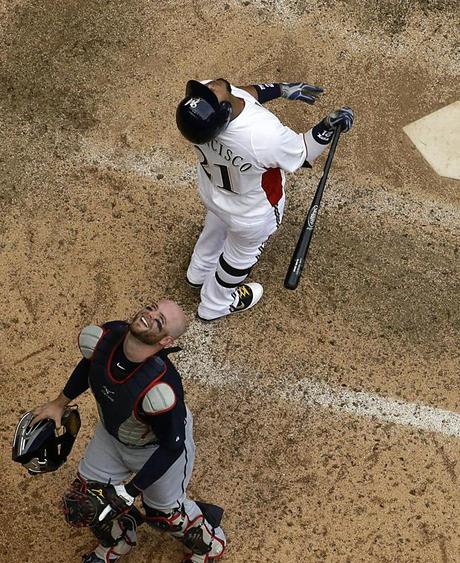When practicing pop-up drills for catchers, there are a number of ways you can do it. The best way, as shown in yesterday’s post, is with a pitching machine. If you do not have one available, it is virtually impossible to mimic the

The best option for most coaches
infield drift part of the play unless you are gifted with a fungo bat. However, you still can practice the basic procedure using some other equipment. Here are three.
- Use a fungo bat. This is extremely difficult but if you are a fungo bat master, by all means use it. It’s the closest you’ll get to a machine when it comes to infield drift.
- Underhand it. Using any balls you have available (baseballs, tennis balls, racquetballs, etc.), underhand the ball straight up after the catcher squats down. To make it more difficult, have the catcher close his eyes and yell NOW! when it’s thrown. The catcher then finds the ball to make the catch. The thrower should move around to alter where the pop-up will be.
- Use a tennis racquet. Using a tennis or racquetball racquet, hit tennis or racquetballs straight up. Usually this is the most effective way to practice this drill if you do not have a pitching machine. A coach can normally hit the ball high enough to mirror a game-like pop-up.
Nuts and bolts of the play. The following is the procedure for a catcher going after a pop-up if in fair or foul territory near the home plate area.
- Take your mask off and find the ball.

Find the ball, throw the mask, stay calm.
- Breathe.
- Turn your back to the infield. If you don’t, you will be catching the ball as it drifts away from you towards the infield. It’s easier to catch if it drifts towards you instead of away from you.
- Breathe.
- Throw your mask opposite the direction you are moving so you don’t trip over it. (Just imagine the embarrassment)
- Breathe.
- Position yourself a couple steps back from the peak of the ball to account for the infield drift.
- Breathe.
- Keep your feet moving – don’t camp under it. You will likely have to make some more minor feet adjustments as the ball comes down.
- Breathe.
- Catch the ball with two hands in front of your face if possible.
I wrote “breathe” a number of times. That is because no matter how many times a catcher practices this play, when it happens in a real game, the catcher often panics and rushes his movements and screws the play up. Catchers should move as quickly as needed while staying calm throughout the process. It will keep the head/eyes still giving causing better vision and better body control as well.
Note: If the catcher should need to dive for a ball near one of the fences, he should always try to slide feet first for safety.
Tomorrow’s post: Too much body


